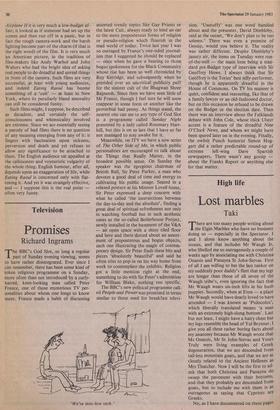Television
Promises
Richard Ingrams
The BBC's God Slot, so long a regular 1 part of Sunday evening viewing, seems to have rather disintegrated. Ever since I can remember, there has been some kind of token religious programme on a Sunday, more often than not introduced by a curly- haired, keen-looking man called Peter France, one of those mysterious TV per- sonalities about whom one longs to know more. France made a habit of discussing
assorted trendy topics like Gay Priests or the latest Cult, always ready to lend an ear to the more preposterous forms of religion or pseudo-religion which flourish in the mad world of today. Twice last year I was so outraged by France's one-sided journal- ism that I suggested he should be replaced — once when he gave a hearing to those bogus spokesmen for the Black Community whose rise has been so well chronicled by Roy Kerridge, and subsequently when he presided over an uncritical publicity puff for the sinister cult of the Bhagwan Shree Rajneesh. Since then we have seen little of Mr France, though I feel sure he will soon reappear in some form or another like the proverbial bad penny. As things stand, the nearest one can see to any type of God Slot is a programme called Sunday Night presented by a lady called. Rosemary Hart- hill, but this is on so late that I have so far not managed to stay awake for it.
Meanwhile, on ITV we have a new series of The Other Side of Me, in which public personalities are encouraged to talk about the Things that Really Matter, in the broadest possible sense. On Sunday the speaker was the egregious chairman of British Rail, Sir Peter Parker, a man who devotes a good deal of time and energy to cultivating his public image. Seated in a relaxed posture at his Minster Lovell home, Sir Peter expressed a deep concern with what he called 'the intersections between the day-to-day and the absolute', finding a great deal of spiritual refreshment not only in watching football but in such aesthetic oases as the so-called Boilerhouse Project, newly installed in the basement of the V&A — an open space with a shiny tiled floor and here and there dotted about an assort- ment of preposterous and bogus objects, each one illustrating the magic of contem- porary design. Sir Peter finds these bits and pieces 'absolutely beautiful' and said he often tries to pop in on his way home from work to contemplate the exhibits. Religion got a little mention right at the end, something to do with Sir Peter's admiration for William Blake, nothing too specific.
The BBC's new political programme call- ed People and Power was promised in terms similar to those used for breakfast televi-
'We're into low tech.'
sion. 'Unstuffy' was one word bandied about and the presenter, David Dimbleby, said at the outset, 'We don't plan to be too solemn.' There was even a promise of Gossip, would you believe it. The reality was rather different. Despite Dimbleby's jaunty air, the items on Tuesday were run- of-the-mill — the main item being a stan- dard pre-Budget type of interview with Sir Geoffrey Howe. I always think that Sir Geoffrey is the Tories' best telly-performer, though he is apparently dreadful in the House of Commons. On TV his manner is quiet, confident and reassuring, like that of a family lawyer or an old-fashioned doctor, but on this occasion he refused to be drawn on the Budget or the election date. Then there was an interview about the Falklands debate with John Cole, whose thick Ulster accent is a feature of the dreadful Nine O'Clock News, and whom we might have been spared later on in the evening. Finally, the owlish Punch humorist Simon Hog- gart did a rather predictable round-up of extreme left-wing Dave Spartish newspapers. There wasn't any gossip about the Franks Report or anything else for that matter.






































 Previous page
Previous page